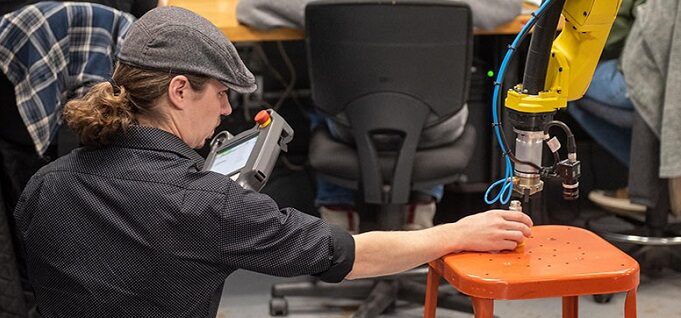Using MentorLinks to revamp biomed tech program
By Madeline Patton
March 15, 2023
North Arkansas College (North Ark) restarted and revamped its biomedical electronics program using MentorLinks connections to information, educators and professional development for its faculty.
“The [MentorLinks] grant has helped establish and direct the biomed program as it stands today,” said Scott Howie, director of the Technical Center at North Ark and the lead for the college’s MentorLinks project.
MentorLinks is a STEM program development initiative offered by the American Association of Community Colleges (AACC) with support from the National Science Foundation (NSF).
North Ark is now ramping up recruitment of U.S. military veterans and individuals who have associate of applied science degrees in electronics to take the program’s 21-credit-hour certificate for entry into the specialized field of biomedical equipment maintenance.
New facility, new opportunities
The curriculum that Howie and electronics instructor John Levy devised with guidance from their MentorLinks mentor Greg Kepner includes two internships and prepares students to take the Biomedical Electronics Technician (BMET) Certification Examination offered by the Association for the Advancement of Medical Instrumentation (AAMI). Technicians with this college certificate and industry certification are eligible for jobs in hospitals and other healthcare facilities.
MentorLinks series: An ongoing series of articles exploring how various community colleges have leveraged the MentorLinks program. The application for the next MentorLinks cohort opens in April.
North Ark’s biomed program–along with the robotics, automation, manufacturing, machining and information technology (IT) programs–are slated to move into an $8 million classroom and lab facility that the college recently started building with a combination of public and private funds.
Part of the new building will mimic a manufacturing facility with a wide range of sensors and other high-tech equipment.
“That level of integration in the real world is so enhanced with the industry 4.0 concepts … and all the cybersecurity,” Levy said.
Influencing other STEM programs
At NorthArk, MentorLinks’ influence extends beyond the biomed program.
For example, Levy and Howie’s tour of FESTO’s manufacturing facility in Mason, Ohio, last fall for to inform their planning of the new lab was facilitated by Thomas Wylie, a North Central State Community College (Ohio) faculty member. They met Wylie at the 2019 ATE Principal Investigators Conference (ATE-PI). Wylie is principal investigator of the Scaling Elements of a Competency-Based Hybrid Instructional Model into Advanced Manufacturing Courses ATE project and became an informal mentor of the North Ark team.
MentorLinks mentees attend the ATE-PI conference, which AACC hosts with NSF support, to connect and learn from educators who have received ATE grants.
“That is a really good conference,” Howie said. “We learned a lot. We got to talk to other schools that had biomed programs. We got to do a lot of information-gathering. We made a lot of connections through that conference. It’s just a wonderful opportunity to find people that are doing what you are doing, especially in specialized areas.”
Wylie’s project and advice from Kepner, their official MentorLinks mentor, also informed the ATE grant proposal that North Ark submitted in October. If they receive the grant, it will support new competency-based modules for more flexible delivery of North Ark’s electronics courses.
The addition of Ashley Jordan as an electronics instructor is expected to help with recruiting military veterans, one of the strategies Howie and Levy planned with Kepner, and the infusion of cybersecurity lessons in biomed and other advanced technology programs.
“The more we get interconnected with all this automation and higher level equipment, the more susceptible we will be. So cybersecurity is an integral part of that in today’s world,” Howie said.
Faculty externship
When Jordan was in the Navy, she was a Tomahawk missile technician. As a civilian, she was a contract employee at the Navy’s Integrated Warfare Systems Lab prior to returning to Arkansas in 2020 to be near family. To broaden her skills beyond cybersecurity, Jordan this year participated in a one-week externship at Wabash, a semi-trailer manufacturer.
Jordan explained that because she had not worked in manufacturing, she wanted to see how employees work with equipment in the Harrison, Arkansas, facility that makes floors for commercial trucks.
“That is something I wanted to get a better look. That way I can better prepare my students so that when they do finish with our program they are ready and they are going to excel in industry. Because that’s my biggest factor: I want them to be fully prepared and I want them to be able to excel quickly,” she said.
For more than a year, Jordan has volunteered at the Jack Williams Veterans Resource Center in Harrison, known as Camp Jack. She thinks the biomedical electronics program could be a good fit for many veterans.
“Regardless of what their skill set was before, they have the etiquette that they need. They have the drive to be able to come here, and go through this program, and come out on the other side where they feel good about themselves… It’s also just helping our community and industry this area in general,” she said.
There’s more to the story! Read the full article in CC Daily.



